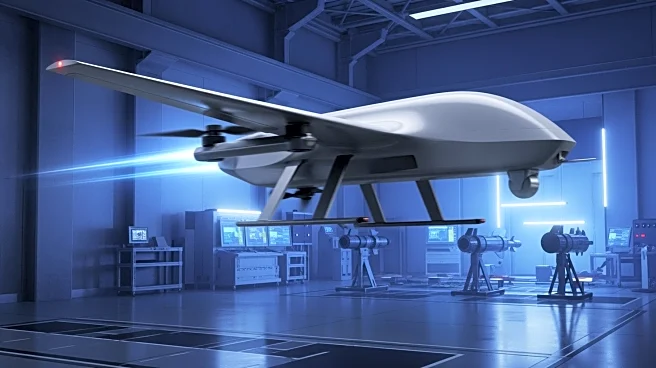What's Happening?
Defense Secretary Pete Hegseth announced a significant shift in the Pentagon's approach to weapons acquisition, emphasizing speed over cost and complexity. Speaking at the National War College, Hegseth outlined
plans to transform the acquisition system to operate on a wartime footing, aiming to rapidly field capabilities. This change comes in response to the evolving nature of warfare, as demonstrated by Ukraine's effective use of mass-produced drones against Russia. Hegseth's approach prioritizes delivering an '85% solution' quickly rather than waiting for a perfect product, which could take years. The initiative seeks to streamline processes and reduce bureaucratic hurdles, potentially sacrificing transparency and functionality for speed.
Why It's Important?
The shift in acquisition strategy is crucial as it reflects the Pentagon's adaptation to modern warfare dynamics, where speed and adaptability are paramount. By prioritizing rapid deployment, the U.S. military aims to maintain a competitive edge against adversaries like China and Russia. This approach could lead to increased production of drones and other technologies that have proven effective in recent conflicts. However, the strategy also poses risks, including potential issues with product reliability and transparency. The move could impact defense contractors, who may need to adjust their business models to align with the new priorities, potentially leading to increased competition and innovation in the defense sector.
What's Next?
The Pentagon's new acquisition strategy will likely lead to changes in defense contracting, with a focus on speed and innovation. Defense contractors may face pressure to invest more in research and development to meet the military's demands. The strategy could also influence the upcoming National Defense Authorization Act, as lawmakers consider how to implement these priorities. Additionally, the Pentagon plans to increase arms sales to allies, boosting the U.S. military industrial base. This could involve streamlining regulations to facilitate faster sales and production, ensuring allies are equipped with the latest military hardware.
Beyond the Headlines
The overhaul of the Pentagon's acquisition process could have broader implications for the defense industry, including ethical and legal challenges. The shift towards rapid deployment may lead to increased scrutiny over the quality and effectiveness of military equipment. There is also the potential for greater fraud and abuse, as the focus on speed may compromise oversight and accountability. Furthermore, the emphasis on innovation and competition could drive long-term changes in the defense sector, encouraging new entrants and technologies that reshape military capabilities.









